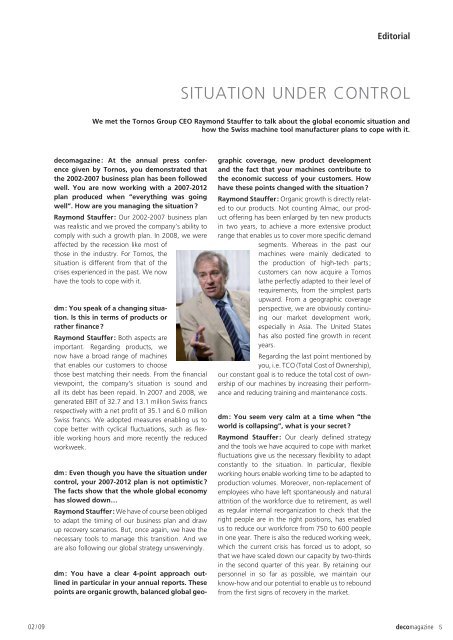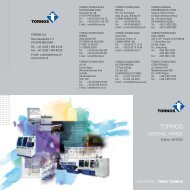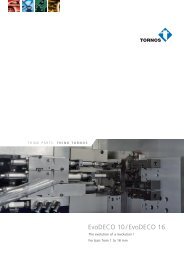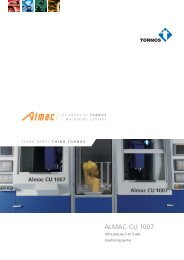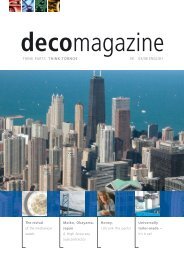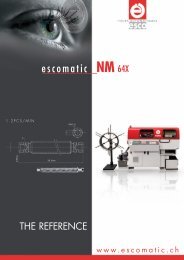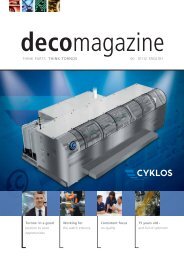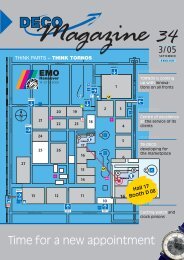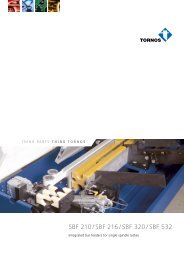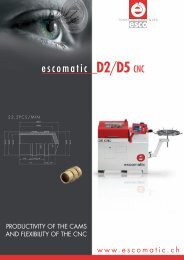PDF EN - Tornos
PDF EN - Tornos
PDF EN - Tornos
Create successful ePaper yourself
Turn your PDF publications into a flip-book with our unique Google optimized e-Paper software.
Editorial<br />
SITUATION UNDER CONTROL<br />
We met the <strong>Tornos</strong> Group CEO Raymond Stauffer to talk about the global economic situation and<br />
how the Swiss machine tool manufacturer plans to cope with it.<br />
decomagazine : At the annual press conference<br />
given by <strong>Tornos</strong>, you demonstrated that<br />
the 2002-2007 business plan has been followed<br />
well. You are now working with a 2007-2012<br />
plan produced when “everything was going<br />
well”. How are you managing the situation <br />
Raymond Stauffer : Our 2002-2007 business plan<br />
was realistic and we proved the company’s ability to<br />
comply with such a growth plan. In 2008, we were<br />
affected by the recession like most of<br />
those in the industry. For <strong>Tornos</strong>, the<br />
situation is different from that of the<br />
crises experienced in the past. We now<br />
have the tools to cope with it.<br />
dm : You speak of a changing situation.<br />
Is this in terms of products or<br />
rather finance <br />
Raymond Stauffer : Both aspects are<br />
important. Regarding products, we<br />
now have a broad range of machines<br />
that enables our customers to choose<br />
those best matching their needs. From the financial<br />
viewpoint, the company’s situation is sound and<br />
all its debt has been repaid. In 2007 and 2008, we<br />
generated EBIT of 32.7 and 13.1 million Swiss francs<br />
respectively with a net profit of 35.1 and 6.0 million<br />
Swiss francs. We adopted measures enabling us to<br />
cope better with cyclical fluctuations, such as flexible<br />
working hours and more recently the reduced<br />
workweek.<br />
dm : Even though you have the situation under<br />
control, your 2007-2012 plan is not optimistic <br />
The facts show that the whole global economy<br />
has slowed down…<br />
Raymond Stauffer : We have of course been obliged<br />
to adapt the timing of our business plan and draw<br />
up recovery scenarios. But, once again, we have the<br />
necessary tools to manage this transition. And we<br />
are also following our global strategy unswervingly.<br />
dm : You have a clear 4-point approach outlined<br />
in particular in your annual reports. These<br />
points are organic growth, balanced global geo-<br />
graphic coverage, new product development<br />
and the fact that your machines contribute to<br />
the economic success of your customers. How<br />
have these points changed with the situation <br />
Raymond Stauffer : Organic growth is directly related<br />
to our products. Not counting Almac, our product<br />
offering has been enlarged by ten new products<br />
in two years, to achieve a more extensive product<br />
range that enables us to cover more specific demand<br />
segments. Whereas in the past our<br />
machines were mainly dedicated to<br />
the production of high-tech parts ;<br />
customers can now acquire a <strong>Tornos</strong><br />
lathe perfectly adapted to their level of<br />
requirements, from the simplest parts<br />
upward. From a geographic coverage<br />
perspective, we are obviously continuing<br />
our market development work,<br />
especially in Asia. The United States<br />
has also posted fine growth in recent<br />
years.<br />
Regarding the last point mentioned by<br />
you, i.e. TCO (Total Cost of Ownership),<br />
our constant goal is to reduce the total cost of ownership<br />
of our machines by increasing their performance<br />
and reducing training and maintenance costs.<br />
dm : You seem very calm at a time when “the<br />
world is collapsing”, what is your secret <br />
Raymond Stauffer : Our clearly defined strategy<br />
and the tools we have acquired to cope with market<br />
fluctuations give us the necessary flexibility to adapt<br />
constantly to the situation. In particular, flexible<br />
working hours enable working time to be adapted to<br />
production volumes. Moreover, non-replacement of<br />
employees who have left spontaneously and natural<br />
attrition of the workforce due to retirement, as well<br />
as regular internal reorganization to check that the<br />
right people are in the right positions, has enabled<br />
us to reduce our workforce from 750 to 600 people<br />
in one year. There is also the reduced working week,<br />
which the current crisis has forced us to adopt, so<br />
that we have scaled down our capacity by two-thirds<br />
in the second quarter of this year. By retaining our<br />
personnel in so far as possible, we maintain our<br />
know-how and our potential to enable us to rebound<br />
from the first signs of recovery in the market.<br />
02 / 09 decomagazine 5


